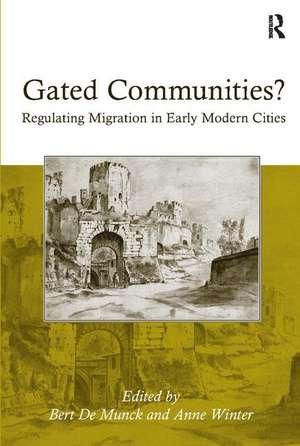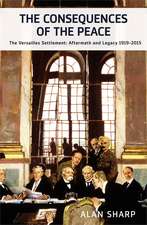Gated Communities?: Regulating Migration in Early Modern Cities
Autor Anne Winter Editat de Bert De Muncken Limba Engleză Paperback – 22 mai 2017
| Toate formatele și edițiile | Preț | Express |
|---|---|---|
| Paperback (1) | 469.34 lei 6-8 săpt. | |
| Taylor & Francis – 22 mai 2017 | 469.34 lei 6-8 săpt. | |
| Hardback (1) | 1109.18 lei 6-8 săpt. | |
| Taylor & Francis – 28 feb 2012 | 1109.18 lei 6-8 săpt. |
Preț: 469.34 lei
Nou
Puncte Express: 704
Preț estimativ în valută:
89.83€ • 92.58$ • 75.84£
89.83€ • 92.58$ • 75.84£
Carte tipărită la comandă
Livrare economică 01-15 martie
Preluare comenzi: 021 569.72.76
Specificații
ISBN-13: 9781138117174
ISBN-10: 113811717X
Pagini: 312
Dimensiuni: 156 x 234 mm
Greutate: 0.45 kg
Ediția:1
Editura: Taylor & Francis
Colecția Routledge
Locul publicării:Oxford, United Kingdom
ISBN-10: 113811717X
Pagini: 312
Dimensiuni: 156 x 234 mm
Greutate: 0.45 kg
Ediția:1
Editura: Taylor & Francis
Colecția Routledge
Locul publicării:Oxford, United Kingdom
Notă biografică
Prof. Dr Bert De Munck, Universiteit Antwerpen, Belgium and Dr Anne Winter, Vrije Universiteit Brussel, Belgium.
Recenzii
'... this book is a useful addition to the literature, underlining the central importance of migration and its management to our understanding of urban development in all periods.' Renaissance Quarterly
Cuprins
1: Regulating Migration in Early Modern Cities: An Introduction; 1: Repertoires of Inclusion and Exclusion: Guilds and Citizenship; 2: Migrant Workers and Illicit Labour: Regulating the Immigration of Building Workers in Sixteenth-Century Antwerp; 3: Craft Guilds and Immigration: Huguenots in German and English Cities; 4: Heresy, War, Vagrancy and Labour Needs: Dealing with Temporary Migrants in the Textile Towns of Flanders, Artois and Hainaut in the Wake of the Dutch Revolt (1566–1609); 5: Local Categories of Residence Redefined: The Former Imperial City of Strasbourg and the Politics of the French Crown (1681–1789); 2: Instruments of Regulation: Policies and Policing; 6: Who Is Not Welcome? Reception and Rejection of Migrants in Early Modern Italian Cities; 7: Immigration Policy in Eighteenth-Century Trieste; 8: Urban Police and the Regulation of Migration in Eighteenth-Century France; 3: Crossing the Lines: Begging and Poor Relief; 9: Magistrates, Beggars, and Labourers: Migration and Regulation in Sixteenth-Century Ulm; 10: Regulating Urban Migration and Relief Entitlements in Eighteenth-Century Brabant; 11: Rough Lives: Autobiography and Migration in Eighteenth-Century England; 4: Comparisons and Conclusions; 12: Cities, States and Migration Control in Western Europe: Comparing Then and Now; 13: Conclusions
Descriere
In this volume, the theme of early-modern European urban migration is explored through a series of historical contexts. Each chapter demonstrates how the presence of diverse and often temporary groups of migrants was a core feature of everyday urban life, and explores the ways in which city authorities attempted to control the moral, political, religious and economic life of these newcomers.















